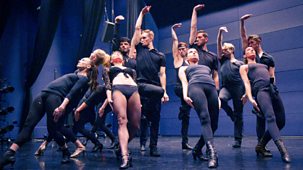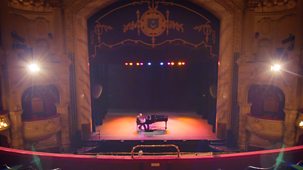
Episode 2
In the second episode of the series, Neil Brand looks at how the movie musical entered a second golden age in the aftermath of World War II. \n\nHe starts by examining one of the most striking films of that era: 1942’s Die Grosse Liebe. This was made at the height of the conflict, and was a Hollywood-style musical with a distinctly German propaganda bent. Starring Hitler’s favourite chanteuse, Zarah Leander, it sent a patriotic and pro-war message through its songs, and became the highest-grossing film ever in the time of the Third Reich.\n\nOnce war had ceased, the American musical once again began to thrive with a colour (literally) and exuberance more pronounced than before. Central to its success, Brand argues, was the emergence of Gene Kelly as the superstar of this new age of Hollywood. Talking with Kelly’s widow, Patricia Ward Kelly, he looks at how this star brought the musical film into the streets of America, most famously with Singin' in the Rain, long believed to be one of the greatest films ever made in any genre.\n\nWhile musicals lit up the idea of the American Dream, they were also a crucial part of national identity in other countries. In newly independent India, the musical became both a popular form and also a tool for reinforcing cultural identity. Brand takes an in-depth look at two of the most significant movies of this period: Guru Dutt’s Pyassa, and Mother India, long held as perhaps the most defining work of post-war Hindi film.\n\nBut it wasn’t just in India that the musical had taken hold of, and reinvigorated, what films could achieve. In China, the Shaw Brothers studios had leapt on the idea of music being a box office draw, and with two remarkable films, The Love Eterne and Hong Kong Nocturne - the latter a remarkable ‘swinging 60s’ romp - taken the country’s cinema to a whole new, Hollywood-inspired level.\n\nHollywood itself had been forced to adapt to keep up with the times. Rock and roll was seen as the future of musicals, first with simple B movies like Rock around the Clock, but later with the more sophisticated MGM movies of Elvis Presley, most notably Jailhouse Rock. And the rock musical kick started a renaissance in British film too, as Cliff Richard and The Shadows took to the screen in blockbusters such as The Young Ones and Summer Holiday. Neil meets Shadows guitarist Bruce Welch to get the insider story of how these Brit flicks became huge successes.\n\nAs the 1960s motored on, the movie musical hit both a boom and a bust. In France, Jacques Demy’s The Umbrellas of Cherbourg was a brilliant New Wave reimagining of the musical form as a kind of working-class operetta. Meanwhile, in Hollywood, Robert Wise’s The Sound of Music became a pinnacle of the form, catapulting Julie Andrews to superstardom and becoming one of the most profitable films of all time.\n\nOn the other hand, a series of big budget flops suggested the musical had run its course in the world of film. Who could forget Clint Eastwood warbling tunelessly through Paint Your Wagon? What would the future of the Hollywood musical be, if it had one? \n\nThe answer was a genius to rival Gene Kelly as a movie musical titan, choreographer-turned-director Bob Fosse. Dropping in on a dance class in New York where Fosse’s highly unique style is still being taught today, Neil Brand shows how with Sweet Charity and Cabaret, Fosse totally revived the fortunes of the musical film.
Source: BBC 4
Most recent episodes of The Sound of Movie Musicals with Neil Brand
The Sound Of Movie Musicals With Neil Brand
Episode 2
In the second episode of the series, Neil Brand looks at how the movie musical entered a second golden age in the aftermath of World War II. \n\nHe starts by examining one of th ...
02-12-2023
BBC 4
The Sound Of Movie Musicals With Neil Brand
Episode 1
In this first episode of a three-part series, presenter and musician Neil Brand argues that the movie musical was the most important form of cinema from the advent of the age of ...
02-12-2023
BBC 4
The Sound Of Movie Musicals With Neil Brand
Episode 3
In this final episode, Neil Brand asks how the movie musical survived in our modern age.\n\nBy the 1970s the whole landscape of cinema had shifted; the biggest movies were no lo ...
02-12-2023
BBC 4
Most popular episodes of The Sound of Movie Musicals with Neil Brand
The Sound Of Movie Musicals With Neil Brand
Episode 2
In the second episode of the series, Neil Brand looks at how the movie musical entered a second golden age in the aftermath of World War II. \n\nHe starts by examining one of th ...
02-12-2023
BBC 4
The Sound Of Movie Musicals With Neil Brand
Episode 3
In this final episode, Neil Brand asks how the movie musical survived in our modern age.\n\nBy the 1970s the whole landscape of cinema had shifted; the biggest movies were no lo ...
02-12-2023
BBC 4
The Sound Of Movie Musicals With Neil Brand
Episode 1
In this first episode of a three-part series, presenter and musician Neil Brand argues that the movie musical was the most important form of cinema from the advent of the age of ...
02-12-2023
BBC 4



